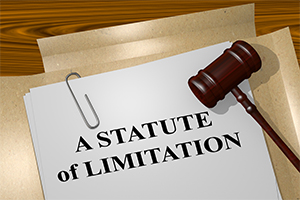The Nursing Home Law Center is committed to providing the legal resources necessary to hold negligent facilities accountable.
Nursing Home Neglect Statute of Limitations

If you or a loved one has suffered due to nursing home neglect, understanding the statute of limitations period is crucial for seeking justice. The nursing home neglect statute of limitations refers to the time frame within which you must file a civil lawsuit after an injury occurs.
Each state has different rules regarding this deadline. If the statute of limitations passes, it can bar your opportunity for recovery entirely, meaning that otherwise valid claims may not be heard in court simply because they were filed late.
If you’re considering taking action based on your legal rights and pursuing a claim related to nursing home neglect, it’s important to speak with a nursing home abuse lawyer as soon as possible to discuss the nursing home neglect statute of limitations in your state.
What Is the Statute of Limitations for Nursing Home Abuse Cases?
Nursing home negligence statutes of limitations for nursing home abuse cases typically range from 1 to 6 years, depending on the state where the incident occurred. These dates sometimes start at the time of the injury, but they could also start at the time it was discovered that the injury was due to negligence.
It’s important to consult with a legal expert who understands the state laws to ensure you meet all deadlines.
State-by-State Overview of Nursing Home Negligence Statutes of Limitations
Understanding the statute of limitations for nursing home negligence cases on a state-by-state basis is crucial for anyone considering legal action. Below, you’ll find the general deadlines applicable to nursing home abuse center claims related to abuse and neglect in nursing homes. Exceptions may arise based on specific circumstances within each case.
It’s important to note that these timeframes apply specifically to negligence claims. If your situation involves medical malpractice claims, the time limit could differ. Always consult a nursing home abuse attorney familiar with local statute of limitations laws to understand fully how nursing home negligence statutes of limitations might affect your particular claim.
- Alabama: 2 years
- Alaska: 2 years
- Arizona: 2 years
- Arkansas: 3 years
- California: 2 years
- Colorado: 2 years
- Connecticut: 2 years
- Delaware: 2 years
- Florida: 2 years for all cases after 3/24/23; 4 years for cases on or before 3/24/23
- Georgia: 2 years
- Hawaii: 2 years
- Idaho: 2 years
- Illinois: 2 years
- Indiana: 2 years
- Iowa: 2 years
- Kansas: 2 years
- Kentucky: 1 year
- Louisiana: 1 year
- Maine: 6 years
- Maryland: 3 years
- Massachusetts: 3 years
- Michigan: 3 years
- Minnesota: 6 years
- Mississippi: 3 years
- Missouri: 5 years
- Montana: 3 years
- Nebraska: 4 years
- Nevada: 2 years
- New Hampshire: 3 years
- New Jersey: 2 years
- New Mexico: 3 years
- New York: 3 years
- North Carolina: 3 years
- North Dakota: 6 years
- Ohio: 2 years
- Oklahoma: 2 years
- Oregon: 2 years
- Pennsylvania: 2 years
- Rhode Island: 3 years
- South Carolina: 3 years
- South Dakota: 3 years
- Tennessee: 1 year
- Texas: 2 years
- Utah: 4 years
- Vermont: 3 years
- Virginia: 2 years
- Washington: 3 years
- Washington, DC: 3 years
- West Virginia: 2 years
- Wisconsin: 3 years
- Wyoming: 4 years
How the Clock Starts: Discovery Rule in Neglect Cases
The discovery rule is an important legal principle that can affect the timeline for filing a lawsuit in nursing home neglect cases. Generally, the nursing home neglect statute of limitations begins running from the date of injury.
However, with the discovery rule, this time frame may not start until you become aware or should have reasonably become aware of the neglect and its impact on your loved one’s health or well-being.
This means if harm went unnoticed initially—perhaps due to subtle signs or a cover-up from the nursing home—the clock could begin ticking only when you recognize that there has been wrongdoing.
By applying this principle, courts aim to ensure victims aren’t unfairly penalized for situations where harm wasn’t immediately apparent. If you’re unsure how this applies to your case, consulting with knowledgeable legal partners can help clarify your rights and the time limit for your case.
Exceptions to the Statute of Limitations
There are a few other exceptions to nursing home negligence statutes of limitations that can affect how long you have to file a lawsuit. The clock is often tolled—paused—if the injured party suffers from incapacitation or if fraud has been committed by nursing home staff members.
For example, when family members don’t realize their loved one is facing neglect or nursing home abuse due to misleading information provided by caregivers, this can impact when they discover harm has occurred.
Most nursing home cases will involve adults, but there are some instances in which care facilities care for minors. In these cases, different rules apply. Here, parents may file lawsuits on behalf of children until those minors reach adulthood in many states.
If the victim decides to file a lawsuit once they reach adulthood, they are usually permitted to do this as well. How long they have to file this claim is state-specific.
Ongoing investigations into nursing home abuse or neglect can also pause nursing home negligence statutes of limitations. If authorities are looking into allegations against a nursing facility at the time an individual recognizes potential wrongdoing, these nursing home abuse cases may have different timelines for filing personal injury claims.
It’s crucial to work with an experienced law firm when navigating legal processes involving nursing home negligence, nursing home abuse, or medical malpractice cases. They can help you understand your state’s specific nursing home neglect statute of limitations and ensure that you meet any required timelines while exploring all possible exceptions applicable to your case.
Why Timeliness Matters in Nursing Home Neglect Cases
Filing a nursing home lawsuit in a timely manner is essential for several reasons. First, preserving evidence plays a critical role in building your case. Documents, medical records, incident reports, and physical evidence can deteriorate or be altered over time, making it harder to prove neglect or abuse.
Second, as time passes, the reliability of witnesses can decline. Memories fade, and details may become blurred when people are asked to recall events months or even years later. Taking legal action quickly helps ensure that you gather solid testimonies from those who witnessed the situation firsthand while their memories are still fresh.
Steps to Take If You Suspect Nursing Home Abuse or Neglect
If you suspect nursing home abuse or neglect, it’s crucial to take quick legal action. Addressing these concerns early can help protect your loved one and contribute to the investigation of potential wrongdoing.
Report Nursing Home Abuse to Authorities
Immediately report any suspected abuse or neglect directly to local authorities. This includes state health departments, adult protective services, and law enforcement if necessary. Promptly reporting helps safeguard your loved one and hopefully initiates an official investigation into the facility.
Consult with an Attorney
After reporting your concerns, consult with a nursing home abuse lawyer who specializes in nursing home personal injury cases.
An experienced attorney makes sure you’re aware of the time limits related to filing a claim—the statute of limitations varies by state—and helps you pursue justice for any wrongs suffered by your elderly family member. Whether it’s medical malpractice, neglect, or wrongful death cases, we can help.
Gather Evidence and Relevant Documentation
Collect evidence as soon as possible, which may include medical records, photographs of injuries, and documentation detailing changes in behavior.
Look for signs like unexplained weight loss, lack of hygiene, and other health concerns that may arise as a result of emotional, physical, or sexual abuse or neglect. This information is essential when pursuing legal action regarding nursing home negligence and filing personal injury claims.
Communicate with the Nursing Home
It’s important to document any communication you have with the nursing home staff or administration. If you raise concerns formally or informally, record your observations and their responses carefully. This dialogue may provide further evidence of neglect or abuse and how the facility handled it.
Seek a Medical Evaluation
Arrange for a thorough medical evaluation of your loved one by an independent professional if there are signs of neglect; this ensures that any health issues resulting from poor care get addressed quickly. A healthcare provider can assess their physical health and mental state, which might indicate harm.
Seek Mental Health Support For Nursing Home Residents
Consider arranging mental health support for your loved one if they’ve experienced emotional abuse or trauma as a result of the neglect. Emotional and psychological impacts can significantly affect their overall well-being, so speaking with a counselor or therapist specializing in elder care can be beneficial.
This step provides necessary support and also helps document the psychological effects of the claim.
Common Mistakes That Can Jeopardize Your Case Timeline
Acting quickly in nursing home abuse cases is essential, as several common mistakes can jeopardize your case timeline. Understanding these pitfalls will help ensure you navigate the process effectively. Make sure you avoid the following:
Waiting Too Long to Act
One of the biggest mistakes family members make is delaying action after suspecting nursing home neglect or abuse. When issues go unaddressed for extended periods, evidence can become obscured or lost altogether; this makes it much harder to build a strong personal injury claim later on.
Remember that even if you are still gathering information about potential wrongdoing, filing reports empowers you to initiate investigations that could safeguard other residents.
Misinterpreting the Statute of Limitations
Another frequent error involves misunderstanding how nursing home negligence statutes of limitations work within nursing home negligence lawsuits. State laws dictating when an injured party must file their claims varies, and miscalculating these timelines may result in losing your opportunity completely once the statute of limitations expires.
Ignoring Early Signs
Another common mistake is dismissing or downplaying early signs of neglect or abuse. If you notice unexplained injuries, dramatic changes in behavior, unexplained weight loss, or a decline in hygiene and overall health, take these red flags seriously. Ignoring them can not only harm your loved one’s well-being but also weaken the foundation of any potential legal action later on.
Choosing Not to Seek Legal Help
Failing to consult with legal representation can be a significant misstep in nursing home abuse cases. Many victims and their families might attempt to handle situations on their own, thinking they can manage the legal process without guidance.
However, laws for wrongful death lawsuits and nursing home negligence are complex and vary widely by state. An experienced law firm specializing in elder abuse and nursing home neglect cases understands the most critical aspects involved.
By avoiding these mistakes and seeking qualified legal assistance as soon as possible, you are giving yourself and your loved one the best chance at recovering what they deserve.

Do You Have a Nursing Home Abuse Lawsuit?
Navigating the complexities of nursing home negligence cases can be challenging, especially when you’re uncertain about timelines and legal options. If you believe a loved one has suffered from abuse or neglect in a nursing facility, it’s essential to act promptly.
Our experienced legal team at Nursing Home Law Center is here to guide you through each step and ensure that your legal rights are protected. Don’t let the statute of limitations pass without seeking justice for what your loved one has endured. Call (800) 926-7565 or complete our online contact form to book a free consultation.

